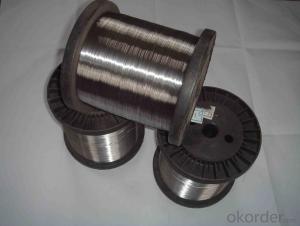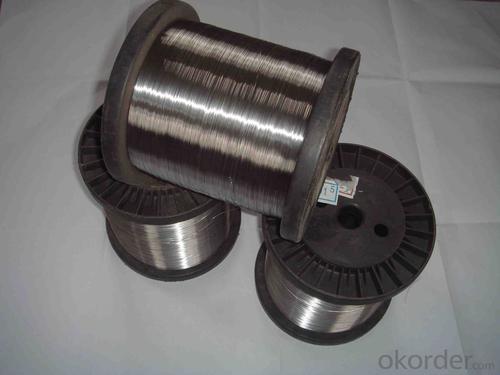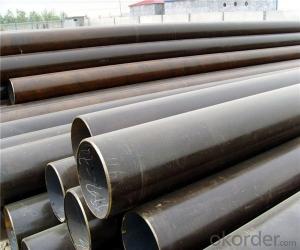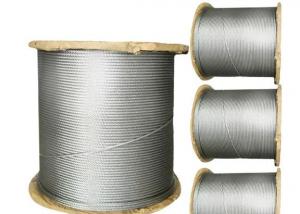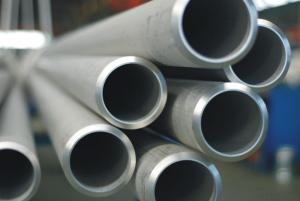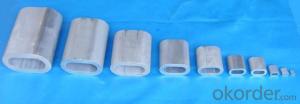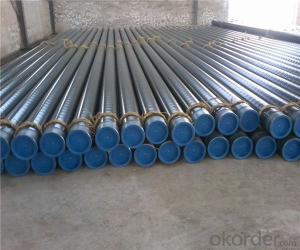Stainless Steel Wire Hot Sale and High Quality
- Loading Port:
- Shanghai
- Payment Terms:
- TT OR LC
- Min Order Qty:
- 5000 kg
- Supply Capability:
- 10000 kg/month
OKorder Service Pledge
OKorder Financial Service
You Might Also Like
1.Packing And Delivery
Package: Seaworthy package
MOQ: 0.5 tons
Delivery: 15-20 days
Monthly Output: 100 tons
Payment : 30%T/T in advanced+70% balanced;irrevocable L/C at sight
Remarks: All-risk insurance and accept the third party test
Port : Shanghai
AISI 316 high tensile strength stainless steel spring wire
| Detail as follows: | |
| Standard | AISI,ASTM,GB,SUS etc |
| Grade | 201,202,204,301,303,304,304L,310,316,316L etc |
| Diameter | 0.7mm-14.0mm |
| Surface | Bright or matt |
| Condition | hard |
| Tolerance | +/-0.03mm |
| Length | According to customers’ requirement |
| Packing | Packed by weaved bag or according to customer's requirements |
| Technology | Cold drawn |
| Application | Spring |
| Productivity | 300 tons/month |
| MOQ | 100KG |
| Note | We can produce other standard as the customers' requirement |
1. Competitive price and quality from our own factory
2. Approved by ISO9001, CE, SGS every year
3. Best service with 24 hour`s reply
4. Flexible payment with T/T,L/C , paypal, kunlun bank, western union, etc.
5. Smooth production ability(50000tons/month)
6. Quick delivery and standard exporting package
7. OEM/ODM
- Q: Can steel pipes be used for conveyor systems?
- Yes, steel pipes can be used for conveyor systems. Steel pipes are often used as structural components in conveyor systems due to their strength, durability, and resistance to corrosion. They can effectively support heavy loads and provide a reliable means of transporting materials in various industries.
- Q: What are the lengths of scaffold steel tubes?
- Used to build scaffolding of steel pipes in general have two kinds, an outer diameter 48mm, wall thickness 3.5mm; another kind of outer diameter 51mm, wall thickness 3mm; according to its location and role of different, can be divided into vertical pole, horizontal rod, sweeping rod, etc.. According to the technical specification for construction of steel tubular scaffold with couplers, JGJ 130 - 2011[1]. The scaffolding steel pipe should be specified with the current national standard "GB/T13793" or "straight seam welded steel pipe welded steel pipe for low pressure liquid delivery" GB/T3091 Q235 ordinary steel pipe; steel pipe steel quality should meet the requirements of current national standard grade Q235 steel "carbon structural steel" in GB/T700. The scaffold pipe shall be made of a diameter of 48.3 * 3.6 steel tubes. The maximum mass of each steel tube shall not be greater than 25.8kg.
- Q: Can steel pipes be bent?
- Steel pipes can indeed be bent. To achieve this, one usually employs specific tools and methods like pipe bending machines or hydraulic presses. These tools exert pressure on the pipe, leading it to change shape and adopt the desired angle or form. The flexibility of steel pipes makes them adaptable and appropriate for an array of purposes, such as plumbing, construction, and manufacturing. Nonetheless, it's crucial to acknowledge that the extent to which a steel pipe can be bent relies on factors like its diameter, wall thickness, and the type of steel employed.
- Q: How do steel pipes resist corrosion?
- Steel pipes resist corrosion through a process called passivation, where a protective layer of chromium oxide forms on the surface of the steel, preventing direct contact with corrosive elements and slowing down the oxidation process. Additionally, steel pipes can be coated with protective layers such as zinc or epoxy to provide an extra barrier against corrosion.
- Q: What are the different types of pipe fittings used with steel pipes?
- There are several types of pipe fittings commonly used with steel pipes, including elbows, tees, reducers, flanges, couplings, and unions.
- Q: How do steel pipes handle water hammer?
- Steel pipes handle water hammer by absorbing the sudden pressure surges caused by rapid changes in water flow. The inherent strength and rigidity of steel pipes allow them to withstand the impact of water hammer without experiencing significant damage or failure.
- Q: How are steel pipes marked for identification?
- Pipe marking is a process used to identify steel pipes. This process involves placing labels or markers on the pipes' surface to provide important information about their specifications and characteristics. The labels typically include details such as the size, grade, material composition, manufacturer's logo or name, and any relevant codes or standards. These markings are crucial for proper identification and ensure that the right pipes are used for specific applications, as well as for maintenance and repair purposes. Furthermore, the markings also assist with quality control and traceability, making it easy to identify and track the pipes throughout their lifespan. In summary, using clear and durable marking systems to identify steel pipes is vital for safety, efficiency, and compliance in various industries where these pipes are used.
- Q: What is the cost of steel pipes?
- The cost of steel pipes can vary depending on factors such as the size, grade, and quantity needed, as well as market conditions and supplier. It is recommended to contact suppliers or check online platforms to get specific pricing information.
- Q: How are steel pipes used in the chemical processing industry?
- Steel pipes are commonly used in the chemical processing industry for various purposes such as transporting chemicals, gases, and liquids, as well as for structural support and containment. They are highly durable, corrosion-resistant, and can withstand high temperatures and pressures, making them ideal for handling and conveying hazardous substances safely.
- Q: Can stainless steel pipes spray black paint?
- Stainless steel pipes can spray black paint.The stainless steel surface with a layer of smooth surface, so the painting before the need to use corner grinder or iron brush to paint out into hair and then paint. Otherwise, spray paint can not be adhered to the surface of the stainless steel pipe.
Send your message to us
Stainless Steel Wire Hot Sale and High Quality
- Loading Port:
- Shanghai
- Payment Terms:
- TT OR LC
- Min Order Qty:
- 5000 kg
- Supply Capability:
- 10000 kg/month
OKorder Service Pledge
OKorder Financial Service
Similar products
Hot products
Hot Searches
Related keywords
